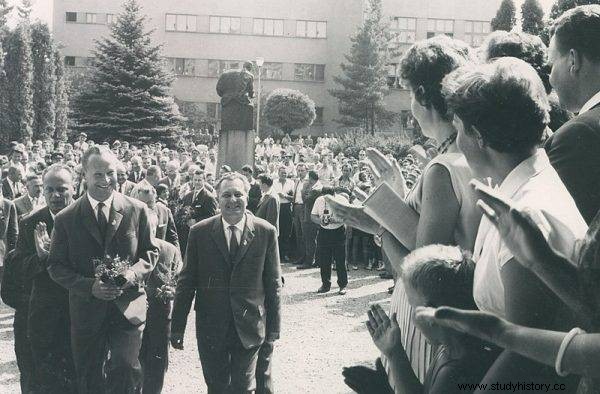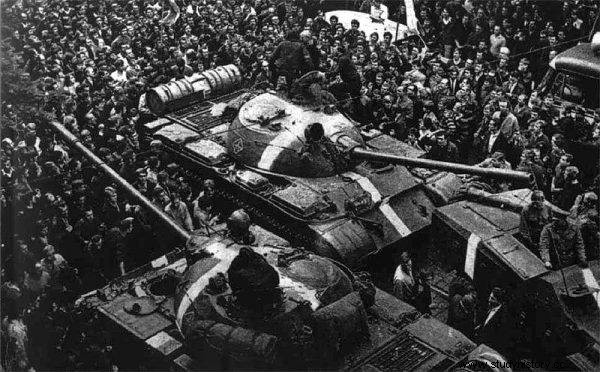On the night of August 20-21, 1968, the troops of the USSR, Poland, Hungary, Bulgaria and the GDR entered Czechoslovakia. This is how the Prague Spring ended.
The departure from Stalinism in Czechoslovakia took a long time. The former order was guaranteed by President Antonin Novotný, who came from communist concrete. Malaise and stuck in the Stalinist mentality aroused more and more resistance. Not only in the society itself, but also among many party activists. Both were about repairing the state, greater civil liberties. No change of the political system or alliances was proposed. The party's forces of conservatives and liberals were fairly balanced, but the latter had the support of the public. They also advocated a reform of the economy, assuming its limited marketization and independence of enterprises.
Rotten compromise
Alexander Dubček was elected head of the party. It was supposed to be a compromise between concrete and reformers. The new secretary spent half his life with the USSR. He graduated from the party school in Moscow. Meanwhile, Dubček quickly became the face of the Prague Spring . The always smiling party secretary has gained a huge sympathy in society.
The manifesto of the changes was the "Two Thousand Words" by journalist and writer Ludvík Vaculík. This document had a huge social impact. The author strongly criticized the communist party. He saw the efforts of the democratic communists to bring about change only as paying off the debt that the communists owed to non-communists. The movement of changes could only start in the communist party, because only the communists led a political life.

Alexander Dubček was elected head of the party. It was supposed to be a compromise between concrete and reformers.
The communist party, in which liberals like Dubček now had the upper hand, with the country's new president, Ludvík Svoboda, responded with a reform program. In it, she pointed to the need to criticize the institution of power. The party was supposed to run the country but not directly manage economic and social life. It was declared that the parliament would be restored to its actual legislative function. The Slovaks were to be enabled to realize their national aspirations by creating a federal state.
The reforms resulted in the awakening of the civil society, the enormous activity of people at all levels of life, the flourishing of the media and culture, which can be compared to the Polish carnival of Solidarity. For Czechs and Slovaks, these were months of freedom and hope, a generational experience.
Gomułka staunchly against Czechoslovakia
The Czechs and Slovaks (and especially the party reformers) hoped that moderate reforms would not provoke a hostile reaction from the USSR. Indeed, the Soviet comrades in the beginning did not push too much for intervention, especially in the military. The communist leaders of Poland and East Germany put pressure on the military action. Władysław Gomułka, who in 1956 risked his life by opposing the Soviets, now feared the "Czechoslovak plague" in Poland . Walter Ulbricht, who was additionally guided by ordinary communist orthodoxy, thought similarly. The Hungarians and Bulgarians also reluctantly joined this alliance. Nicolae Ceauşescu, the Romanian leader, broke away.

Over 200,000 people entered the territory of Czechoslovakia. soldiers and over 4,000 tanks.
Leonid Brezhnev, secretary of the Communist Party of the USSR and other fraternal leaders of the people's democracy camp decided to act in accordance with the (Brezhnev) doctrine. It proclaimed that what was happening in one of the countries of the camp was a matter for the entire camp. Imprisoning the Czechoslovak leaders and forcing them to cancel the reforms may not have been enough. Changes in society have gone too far. Military intervention was needed and "normalization" introduced by faithful comrades under the cover of Soviet tanks.
The military invasion under the code name operation "Danube" took place on the night of August 20-21, 1968 by the military forces of the USSR, Poland, East Germany, Hungary and Bulgaria. Over 200,000 people entered the territory of Czechoslovakia. soldiers and over 4,000 tanks. The Polish contingent counted 26 thousand. soldiers and 600 tanks. The President of Czechoslovakia, Gen. Ludvík Svoboda, ordered the army to remain in the barracks.
Normalization like in the GDR
Immediately after the invasion, the presidium of the Central Committee of the Communist Party of Czechoslovakia protested against it. This was considered an act contrary to the fundamental principles of relations between states and international law. Citizens were urged not to resist the encroaching troops. The Soviets detained Dubček and other party leaders. They took them to Moscow where they tried to get them to support the invasion.
Passive resistance and spontaneous demonstrations were organized from below, especially in Prague. The day after the intervention, there was a one-hour general strike. Resistance from society resulted in casualties, in total the troops participating in the intervention resulted in the death of 90 people , mainly in Prague.

Resistance from the public resulted in casualties, and the troops participating in the intervention killed 90 people, mainly in Prague.
As a result of the talks which lasted from 23 to 26 August, the Czechoslovak side was forced by blackmail and threats to make concessions. It agreed to invalidate the 14th Communist Party of the Czechoslovak Communist Party, to restore censorship in the media, and to withdraw the "Czechoslovak issue" from the UN Security Council. The concluded agreement also allowed for the stationing of foreign troops on the territory of the country.
In April 1969, Dubček stepped down as secretary of the Central Committee of the Communist Party of the Czech Republic. He was replaced by Gustáv Husák, a hard-headed communist. The purges swept the party and almost every area of the country's life. The power was taken over by apparatchiks who introduced a doctrinaire regime comparable to that of the GDR. Repression was widespread against the participants and supporters of the Prague Spring. Tens of thousands of Czechs and Slovaks emigrated.
Bibliography
- Jacek Tebinka, Why did Poland take part in the aggression against Czechoslovakia in 1968?, Polityka's historical guide, 10 July 2018
